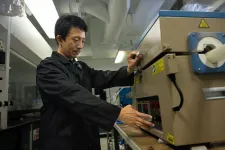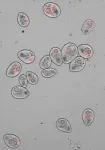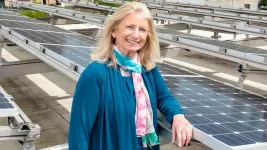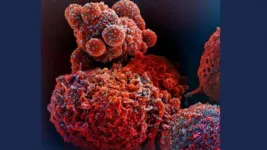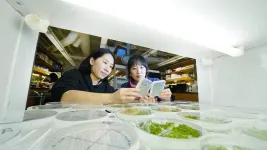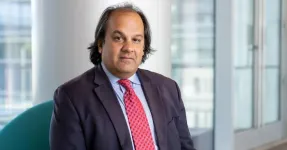(Press-News.org) Video available here.
In an effort to reduce the environmental impact of carbon dioxide emissions, a University of Central Florida researcher has developed a new technology that captures carbon dioxide and outputs useful fuels and chemicals.
Yang Yang, an associate professor in UCF’s NanoScience Technology Center, created an innovative device that captures carbon dioxide with a microsurface comprised of a tin oxide film and fluorine layer. The device then extracts gaseous carbon dioxide via a bubbling electrode and selectively converts the gases into carbon monoxide and formic acid, which are important raw materials for manufacturing chemicals.
This technology, detailed in a recent study in the Journal of the American Chemical Society, aims to reduce humanity’s carbon footprint sustainably while addressing the need to produce alternative energy.
“We want to create a better technology to make our world better and cleaner,” says Yang, who also is a member of UCF’s Renewable Energy and Chemical Transformation (REACT) Cluster. “Too much carbon dioxide will have a greenhouse effect on the Earth and will heat it up very quickly. It’s the motivation for why we want to develop this new material to grab and convert it into chemicals we can use.”
This carbon dioxide capture technology could be located at power plants, industrial facilities, or chemical production plants where carbon dioxide is captured from emissions and converted into useful products.
Design Blossomed from Nature
The inspiration for the device and mitigating our impact on the environment came directly from nature itself, Yang says.
“We as scientists always learn from nature,” he says. “We want to see how the animals and the trees work. For this work, we learned from the lotus. We know that the lotus has a really hydrophobic surface, which means when you drop water on the surface, the water will go quickly away from the surface. We also know that green plants absorb carbon dioxide and convert it to oxygen through photosynthesis.”
The lotus helped Yang conceive of carbon dioxide capture technology that mimics the lotus surface, in which water trickling down a device’s fabricated hydrophobic surface would be separated from the carbon dioxide conversion reactoin.
It’s necessary to carefully manage the amount of water on the surface of materials that may flood the device or disrupt carbon dioxide conversion, Yang says.
Once captured, the carbon dioxide gas is then routed through an electrode and converted through a more customizable process than naturally occurring photosynthesis.
The electrocatalytic carbon dioxide reduction reaction converts carbon dioxide gas into carbon-containing chemicals, such as methanol, methane, ethylene, ethanol, acetate, and propanol, depending on the specific reaction pathways on the catalysts.
“We want to create a better material which can quickly grab carbon dioxide molecules from the air and convert them into chemicals,” Yang says. “We just reduce the concentration of carbon dioxide in the air and convert it in the liquid and gas phase so we can directly use those converted chemicals and fields for other applications.”
One of the most challenging components of the research was reducing the amount of water spread out on the surface of the catalytic materials when exposing the components of gaseous carbon dioxide in the liquid electrolyte, he says.
“If you have too much water surrounding your materials, you may produce hydrogen instead of converting carbon dioxide to chemicals,” Yang says. “That will decrease the energy efficiency of the overall process. The materials we use can repel the water from the surface, so we can avoid the formation of hydrogen, and we can greatly enhance the carbon dioxide reduction efficiency. So that means eventually we can use almost all of the electricity for our reaction.”
Scaling Up
There are many existing efforts around the world to reduce, capture or convert carbon dioxide including planting trees and developing large-scale carbon dioxide capture technologies.
Yang says he hopes his carbon dioxide capture and conversion device may serve as a viable alternative option to other more time-consuming or costly methods.
Harnessing environmentally sustainable electricity is another step in implementing the carbon dioxide conversion technology into reality, Yang says.
“In our process, we can use intermittent electricity, like the electricity coming from the solar panel or from the wind farm,” he says.
The technology is built off Yang’s previous energy efforts at UCF nearly three years ago in developing new materials for fuel cells that used fluorine-enhanced carbon.
The research serves as an important first step and a is fundamental study that may pave the way for more large-scale carbon dioxide capture methods, Yang says.
“For this, we validated our concept from the fundamental point of view,” he says. “We tested the performance in our reactors, but in the future, we want to develop a bigger prototype that can show people how quickly we can convert and reduce the carbon dioxide concentration and generate chemicals or fuels very quickly from our large-scale prototype.”
Yang worked with following researchers, students and postdoctoral scholars from UCF’s Department of Materials Science and Engineering, NanoScience Technology Center and Department of Chemistry: Lei Zhai, Fnu Joshua ’20MS, David Fox ’16 ’22PhD, Shengwen Liu, Zhao Li ’18MS ’22PhD, Jinfa Chang, Guanzhi Wang ’23PhD, Ao Yu, Wei Zhang ’23PhD.
He also collaborated with the University of Houston; the University of California, Berkley; Stanford University and the Eastern Institute for Advanced Study in Ningbo, China.
The research was funded the by U.S. National Science Foundation and The American Chemical Society Petroleum Research Fund.
Researcher’s Credentials
Yang holds joint appointments in UCF’s NanoScience Technology Center and the Department of Materials Science and Engineering, which is part of the university’s College of Engineering and Computer Science. He is a member of UCF’s Renewable Energy and Chemical Transformation (REACT) Cluster. He also holds a secondary joint-appointment in UCF’s Department of Chemistry and The Stephen W. Hawking Center for Microgravity Research and Education. Before joining UCF in 2015, he was a postdoctoral fellow at Rice University and an Alexander von Humboldt Fellow at the University of Erlangen-Nuremberg in Germany. He received his doctorate in materials science from Tsinghua University in China.
END
UCF researcher develops lotus-inspired tech to convert CO2 to fuels, chemicals
Nanoscience Associate Professor Yang Yang has designed a nature-inspired filtration and conversion system that extracts carbon dioxide gas from the atmosphere to create fuels and chemicals
2024-08-20
ELSE PRESS RELEASES FROM THIS DATE:
Predation drives opportunistic bacteria to become more virulent
2024-08-20
Opportunistic pathogens are typically benign microbes that can sometimes cause infections in individuals with weakened immune systems or when they gain access to sterile areas of the body. Unlike obligate pathogens, opportunistic pathogens do not depend on host infection or transmission for survival, making it difficult to determine the factors driving the evolution of virulence in these microbes. Nevertheless, given their potential to cause severe infections in immunocompromised patients and the increasing prevalence ...
Renewable energy policies provide benefits across state lines
2024-08-20
While the U.S. federal government has clean energy targets, they are not binding. Most economically developed countries have mandatory policies designed to bolster renewable electricity production. Because the U.S. lacks an enforceable federal mandate for renewable electricity, individual states are left to develop their own regulations.
Marilyn Brown, Regents’ and Brook Byers Professor of Sustainable Systems in Georgia Tech’s School of Public Policy; Shan Zhou, an assistant professor at Purdue University and Georgia Tech Ph.D. alumna; and Barry Solomon, a professor emeritus of environmental policy at Michigan Technological University, investigated ...
Be in the know! Press conference schedule for ESC Congress 2024 released!
2024-08-20
Sophia Antipolis, 20 August 2024: It’s not long before the global cardiology community converges in London for the European Society of Cardiology (ESC)’s annual gathering, unveiling the latest practice-changing science.
The ESC Press Conference Schedule is now available, detailing the nine press conferences that will take place from Thursday 29 August to Sunday 1 September, and can be accessed in person or online. Accredited journalists will also be able to access embargoed press materials in the digital press area from Thursday 22 August.
Join triallists and ESC spokespersons for eight press conferences on the Hot ...
To subvert immune response, COVID virus stimulates production of proteins without protective function
2024-08-20
To evade the human host’s immune response, SARS-CoV-2, the coronavirus that causes COVID-19, uses the machinery of defense cells to induce the expression of unproductive isoforms of key antiviral genes – variant forms of genes that result from disrupted splicing or transcription processes and do not code for functional (protective) proteins. This is a key finding of a study conducted by researchers at the Albert Einstein Jewish Brazilian Hospital (HIAE), the University of São Paulo (USP) and the ...
UC Irvine-led team finds that compound in rosemary extract can reduce cocaine sensitivity
2024-08-20
Irvine, Calif., Aug. 20, 2024 — A team of researchers led by the University of California, Irvine has discovered that an antioxidant found in rosemary extract can reduce volitional intakes of cocaine by moderating the brain’s reward response, offering a new therapeutic target for treating addiction.
The study, recently published online in the journal Neuron, describes team members’ focus on a region of the brain called the globus pallidus externus, which acts as a gatekeeper that regulates how we react to cocaine. ...
Purdue researchers receive additional $95K to develop arthritis treatments, drought-resistant soybeans
2024-08-20
WEST LAFAYETTE, Ind. — Researchers in Purdue University’s colleges of Agriculture and Science have received an additional $95,000 from the Trask Innovation Fund to develop patent-pending drought-resistant soybean plants and novel arthritis treatments.
The fund is managed by the Purdue Innovates Incubator, which provides programming for the Purdue University community to ideate, refine and support their solutions. Funding recipients can receive up to $50,000 for their initial project; ...
Social responsibility audits can bias financial ones
2024-08-20
AUSTIN, Texas — During the past decade, auditors have found a booming new business: reviewing reports on companies’ environmental, social, and governance (ESG) activities. ESG reporting among S&P 500 companies grew 80% from 2010 to 2020, with nearly half the companies hiring auditors to give seals of approval.
But while ESG reporting brings new opportunities to auditors, it can also bring new headaches, according to a new study from Texas McCombs. Test subjects who engaged auditors to review their ESG reports often pressured them to be more lenient on their financial reports — and auditors ...
Modic changes linked to microbial differences in lumbar spine
2024-08-20
August 20, 2024 — Among patients undergoing lumbar spinal fusion, the presence of Modic changes is associated with differences in microbial diversity and metabolites in the lumbar cartilaginous endplates (LCEPs), reports a study in The Journal of Bone & Joint Surgery. The journal is published in the Lippincott portfolio by Wolters Kluwer.
"These findings suggest that changes in the microbiota may disrupt unsaturated fatty acid metabolism within the LCEP microenvironment, potentially influencing the onset and progression of Modic changes [MCs]," according to the new research ...
Atul Malhotra, M.D., receives prestigious lifetime achievement award
2024-08-20
Atul Malhotra, MD, Peter C. Farrell Presidential Endowed Chair in Pulmonary Medicine at University of California San Diego School of Medicine and pulmonologist at UC San Diego Health, has been named recipient of the 2024 Sleep and Respiratory Neurobiology Lifetime Achievement Award by the American Thoracic Society.
The award is given annually to honor the career of an individual who has made outstanding contributions to the field of sleep or respiratory neurobiology in terms of both scientific and scholarly advances, as well as in mentoring, teaching and advocacy to advance public health.
Recipients are recognized for achievement in scholarship over the course of an entire ...
Brigham researchers use AI tools to uncover connections between radiotherapy for lung cancer and heart complications
2024-08-20
Researchers from Brigham and Women’s Hospital, a founding member of the Mass General Brigham healthcare system, have used artificial intelligence tools to accelerate the understanding of the risk of specific cardiac arrhythmias when various parts of the heart are exposed to different thresholds of radiation as part of a treatment plan for lung cancer. Their results are published in JACC: CardioOncology.
“Radiation exposure to the heart during lung cancer treatment can have very serious and immediate effects on a patient’s cardiovascular ...
LAST 30 PRESS RELEASES:
Korea University, Stanford University, and IESGA launch Water Sustainability Index to combat ESG greenwashing
Molecular glue discovery: large scale instead of lucky strike
Insulin resistance predictor highlights cancer connection
Explaining next-generation solar cells
Slippery ions create a smoother path to blue energy
Magnetic resonance imaging opens the door to better treatments for underdiagnosed atypical Parkinsonisms
National poll finds gaps in community preparedness for teen cardiac emergencies
One strategy to block both drug-resistant bacteria and influenza: new broad-spectrum infection prevention approach validated
Survey: 3 in 4 skip physical therapy homework, stunting progress
College students who spend hours on social media are more likely to be lonely – national US study
Evidence behind intermittent fasting for weight loss fails to match hype
How AI tools like DeepSeek are transforming emotional and mental health care of Chinese youth
Study finds link between sugary drinks and anxiety in young people
Scientists show how to predict world’s deadly scorpion hotspots
ASU researchers to lead AAAS panel on water insecurity in the United States
ASU professor Anne Stone to present at AAAS Conference in Phoenix on ancient origins of modern disease
Proposals for exploring viruses and skin as the next experimental quantum frontiers share US$30,000 science award
ASU researchers showcase scalable tech solutions for older adults living alone with cognitive decline at AAAS 2026
Scientists identify smooth regional trends in fruit fly survival strategies
Antipathy toward snakes? Your parents likely talked you into that at an early age
Sylvester Cancer Tip Sheet for Feb. 2026
Online exposure to medical misinformation concentrated among older adults
Telehealth improves access to genetic services for adult survivors of childhood cancers
Outdated mortality benchmarks risk missing early signs of famine and delay recognizing mass starvation
Newly discovered bacterium converts carbon dioxide into chemicals using electricity
Flipping and reversing mini-proteins could improve disease treatment
Scientists reveal major hidden source of atmospheric nitrogen pollution in fragile lake basin
Biochar emerges as a powerful tool for soil carbon neutrality and climate mitigation
Tiny cell messengers show big promise for safer protein and gene delivery
AMS releases statement regarding the decision to rescind EPA’s 2009 Endangerment Finding
[Press-News.org] UCF researcher develops lotus-inspired tech to convert CO2 to fuels, chemicalsNanoscience Associate Professor Yang Yang has designed a nature-inspired filtration and conversion system that extracts carbon dioxide gas from the atmosphere to create fuels and chemicals
